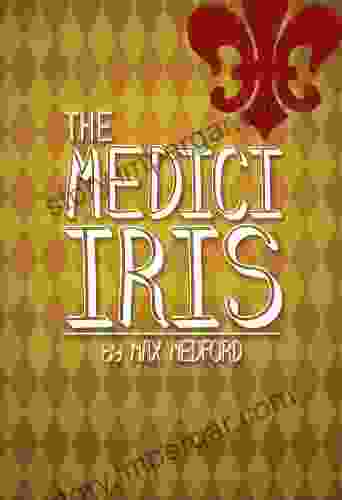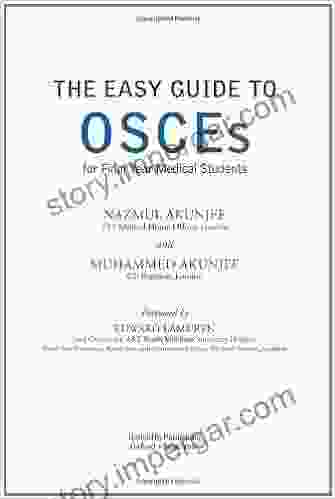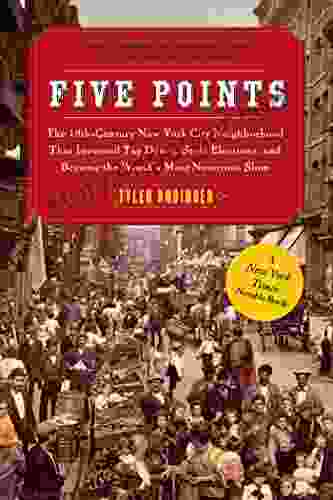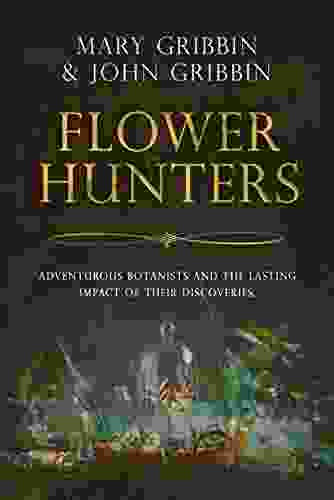The Easy Guide to OSCEs for Final Year Medical Students: Masterpass

OSCEs (Objective Structured Clinical Examinations) are a common assessment method for final year medical students. They test your clinical skills in a simulated environment, and they can be a daunting prospect. But with the right preparation, you can master the stations and pass with confidence.
This guide will provide you with everything you need to know about OSCEs, from the different station formats to the marking criteria. We'll also give you tips on how to prepare for each station and how to perform well on the day of the exam.
OSCEs are a type of clinical assessment that uses standardized patients to simulate real-life patient encounters. The stations are designed to test your clinical skills, such as your history-taking, physical examination, and communication skills.
4.7 out of 5
| Language | : | English |
| File size | : | 3668 KB |
| Text-to-Speech | : | Enabled |
| Screen Reader | : | Supported |
| Print length | : | 432 pages |
OSCEs are typically held over one or two days, and you will be required to rotate through a series of stations. Each station will have a specific scenario and set of instructions. You will have a limited amount of time to complete each station, so it is important to be well-prepared.
There are a variety of different station formats that can be used in OSCEs. The most common formats include:
- History-taking stations: These stations test your ability to take a patient's history. You will be given a brief scenario and a set of questions to ask the patient.
- Physical examination stations: These stations test your ability to perform a physical examination. You will be given a brief scenario and a set of instructions on how to perform the examination.
- Communication skills stations: These stations test your ability to communicate with patients and other healthcare professionals. You will be given a brief scenario and a set of instructions on how to communicate with the patient or healthcare professional.
- Procedural skills stations: These stations test your ability to perform a specific procedure. You will be given a brief scenario and a set of instructions on how to perform the procedure.
OSCEs are marked using a standardized marking scheme. The marking criteria will vary depending on the station format, but they will typically include the following:
- Communication skills: Your ability to communicate with patients and other healthcare professionals in a clear and concise manner.
- Clinical skills: Your ability to perform clinical skills such as history-taking, physical examination, and procedural skills.
- Professionalism: Your ability to maintain a professional demeanor throughout the examination.
The best way to prepare for OSCEs is to practice as much as possible. You can practice with friends, family members, or other medical students. You can also find practice OSCE stations online or at your university's library.
When practicing, it is important to focus on the following:
- Communication skills: Make sure that you are able to communicate with patients and other healthcare professionals in a clear and concise manner.
- Clinical skills: Practice your clinical skills until you are able to perform them confidently and accurately.
- Professionalism: Maintain a professional demeanor throughout the examination.
On the day of the exam, it is important to arrive well-rested and prepared. You should also make sure that you have eaten a healthy breakfast.
Once you arrive at the exam center, you will be given a briefing on the exam procedure. You will then be assigned to a group of stations.
When you are at a station, it is important to:
- Listen carefully to the instructions. Make sure that you understand what is expected of you.
- Be confident. Believe in your abilities and perform the station to the best of your ability.
- Don't panic. If you make a mistake, don't panic. Just take a deep breath and continue with the station.
OSCEs can be a daunting prospect, but with the right preparation, you can master the stations and pass with confidence. This guide has provided you with everything you need to know about OSCEs, from the different station formats to the marking criteria. We've also given you tips on how to prepare for each station and how to perform well on the day of the exam.
So what are you waiting for? Start preparing today and ace your OSCEs!
4.7 out of 5
| Language | : | English |
| File size | : | 3668 KB |
| Text-to-Speech | : | Enabled |
| Screen Reader | : | Supported |
| Print length | : | 432 pages |
Do you want to contribute by writing guest posts on this blog?
Please contact us and send us a resume of previous articles that you have written.
 Book
Book Novel
Novel Page
Page Chapter
Chapter Text
Text Story
Story Genre
Genre Reader
Reader Library
Library Paperback
Paperback E-book
E-book Magazine
Magazine Newspaper
Newspaper Paragraph
Paragraph Sentence
Sentence Bookmark
Bookmark Shelf
Shelf Glossary
Glossary Bibliography
Bibliography Foreword
Foreword Preface
Preface Synopsis
Synopsis Annotation
Annotation Footnote
Footnote Manuscript
Manuscript Scroll
Scroll Codex
Codex Tome
Tome Bestseller
Bestseller Classics
Classics Library card
Library card Narrative
Narrative Biography
Biography Autobiography
Autobiography Memoir
Memoir Reference
Reference Encyclopedia
Encyclopedia Martin Barker
Martin Barker Refe Tuma
Refe Tuma Robert Davis
Robert Davis Marci Darling
Marci Darling Matt Newbury
Matt Newbury Matt Garrett
Matt Garrett Mary Spohn
Mary Spohn Mobo Reader
Mobo Reader Maud W Gleason
Maud W Gleason Markus Hermannsdorfer
Markus Hermannsdorfer Michael Muth
Michael Muth Roberto Verganti
Roberto Verganti Susan Dicker
Susan Dicker Martha Morales
Martha Morales Miriam T Griffin
Miriam T Griffin Matthew Goodman
Matthew Goodman Shirley Taylor
Shirley Taylor Mark J Holt
Mark J Holt Michele Sfakianos
Michele Sfakianos Mary Lay Schuster
Mary Lay Schuster
Light bulbAdvertise smarter! Our strategic ad space ensures maximum exposure. Reserve your spot today!

 Harold BlairUnofficial Minecrafters Novel: The Lost Brother - An Epic Adventure in the...
Harold BlairUnofficial Minecrafters Novel: The Lost Brother - An Epic Adventure in the... Clayton HayesFollow ·5.2k
Clayton HayesFollow ·5.2k Easton PowellFollow ·4.1k
Easton PowellFollow ·4.1k Matthew WardFollow ·19.9k
Matthew WardFollow ·19.9k Cameron ReedFollow ·4.8k
Cameron ReedFollow ·4.8k Alexander BlairFollow ·11.5k
Alexander BlairFollow ·11.5k Jack LondonFollow ·12.3k
Jack LondonFollow ·12.3k Eddie PowellFollow ·16.6k
Eddie PowellFollow ·16.6k Vic ParkerFollow ·12.8k
Vic ParkerFollow ·12.8k

 Roberto Bolaño
Roberto BolañoUnveiling the Beauty and History of the Medici Iris: A...
In the realm of...

 Theodore Mitchell
Theodore MitchellImproving Gut Health in Poultry: Unlocking the Path to...
In the ever-evolving field of...

 Victor Hugo
Victor HugoPersonalized Medicine with a Nanochemistry Twist:...
The future of healthcare...

 George Martin
George MartinA Year Of Wine: Perfect Pairings Great Buys And What To...
## Year of Wine: An Epic Journey Through the...

 Tom Hayes
Tom HayesDelve into the Enigmatic World of Southern Africa's...
Embark on a captivating journey through the...
4.7 out of 5
| Language | : | English |
| File size | : | 3668 KB |
| Text-to-Speech | : | Enabled |
| Screen Reader | : | Supported |
| Print length | : | 432 pages |












